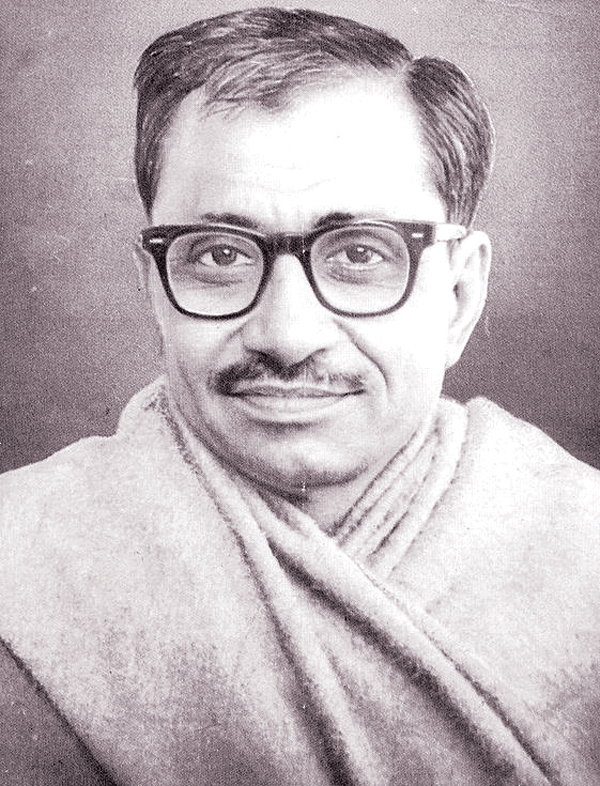LIFE AN INTEGRATED WHOLE
THE first characteristic of Bharatiya culture is that it looks upon life as an integrated whole. It has an integrated view-point. To thank of parts may be proper for a specialist but it is not useful from the practical standpoint. The confusion in the West arises primarily from its tendency to think of life in sections and then to attempt to put them together by patch-work.
ONLY ONE CULTURE
THERE can be only one The slogan of many cultures can break this country into pieces and destroy it. Hence the two-culture theory of the Muslim League, the covert two-culture theory of the Congress and the multi-culture theory of the Communists are wrong. Till now only the multi-culture theory has culture in India.been denounced as communalism, but now even scholars in the Congress are realising their mistake and accepting the one-culture theory. It is this sentiment of one culture that can preserve the unity and integrity of India and solve all our problems.
CULTURAL BASIS INDEPENDENCE
FROM the national standpoint we shall have to consider our culture because that is our very nature. Independence is intimately related to one’s own culture. If culture does not form the basis of independence then the political movement for independence would degenerate into a scramble by selfish and power-seeking persons. Independence can be meaningful only if it becomes an instrument for the expression of our culture. Such expression will not only contribute to our progress but the effort required will also give us the experience of joy.
CULTURAL FREEDOM
ALONG with economic independence social and cultural independence is also necessary. If those social systems that a nation creates for the manifestation of its soul become in course of time a hindrance to national progress, giving them up becomes necessary in the interest of the nation. It is not necessary that certain means which are useful in one phase of the journey may continue to be useful in the next phase. The means should be in accordance with the phase and the temptation to stick to old means can lead to the loss of independencc. For independence is a synthesis of those elements which help self-realisation at a particular point in time.
NATIONHOOD THROUGH CULTURE
IF one has to understand the soul of Bharat one must not look at this country from the political or economic angle but from the cultural point of view.
‘Bharatiyata’ (nationhood of Bharat) can manifest itself not through politics but through culture. If we have anything that we can teach the world, it is the feeling of cultural tolerance and a life dedicated to duty.
OUR THREE-FOLD AIM
INDIA has achieved freedom from the British after great efforts. Under no circumstances would we like to lose this independence. The first objective of our plan is to give us the strength to protect our political independence. Secondly we have chosen a democratic form of government. If any programme of economic development proves an obstruction to our democratic system it would not be acceptable to us. Thirdly we have some cultural values of life which are the source result as well as measure of our national life and are also extremely valuable for the entire world. To acquaint the world with this culture should be our supreme national goal. Material prosperity acquired at the cost of this culture would be no prosperity at all.
Our Nationhood
WHAT IS A NATION ?
WHEN a group of persons lives with a goal, an ideal, a mission, and looks upon a particular piece of land as motherland, it constitutes a nation. If either of the two-and ideal and a motherland-is not there, then there is no nation.
ESSENTIALS OF NATION
A ‘NATION’ requires four things. The first is land or people, whom. we call a country. The second is a collective will for a corporate life. The third is a system which we can call a constitution but which can far more appropriately be called |Dharma’. And the fourth is an ideal of life. The synthesis of all these four is called a Nation. As an individual is made up of body, minds intelligence and soul, a nation is mode up of country, will, Dharma and ideal.
NATION IS PERMANENT
THE Nation is a permanent truth. The State is created to fulfill the needs of the nation. Two reasons have been given for the origin of the State. It is said that the State becomes necessary in two circumstances. The first is when some distortion enters the people of the nation. The State is established to control the problems that arise in such a situation. For example, one does not see the police when there is no quarrel. But if there is a fight the police are immediately called. The second need is when some complexity appears in society and it becomes necessary to bring order in corporate life.
The State is created so that the powerful, prosperous and resourceful class of society should not exploit the weak, the helpless and the poor, and everyone should remain within the bounds of justice. It is only these two reasons that give rise to the State. To regulate the distortion that may have entered into society, to establish peace by punishes; wrong-doers and to solve the complexity within a society so that life of every individual becomes just, honourable and easy-these have been considered the functions of the State.
A third function is an important aspect of the fulfilment of these two functions. It is to establish relations with other states. Hence security from external aggression is also a function of the State.
(Excerpts from the book – “Pandit Deendayal Upadhyaya
A Profile” edited by Sudhakar Raje)


